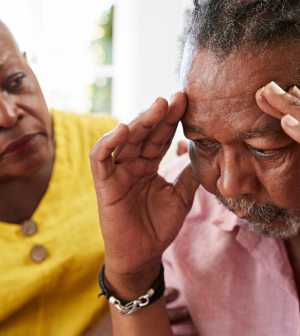- Could Your Grocery Store Meat Be Causing Recurring UTIs?
- Are You Making This Expensive Thermostat Error This Winter?
- Recognizing the Signs of Hypothyroidism
- 10 Strategies to Overcome Insomnia
- Could Artificial Sweeteners Be Aging the Brain Faster?
- Techniques for Soothing Your Nervous System
- Does the Water in Your House Smell Funny? Here’s Why
- Can a Daily Dose of Apple Cider Vinegar Actually Aid Weight Loss?
- 6 Health Beverages That Can Actually Spike Your Blood Sugar
- Treatment Options for Social Anxiety Disorder
Depression Can Strike Patients With Heart Failure, But Two Therapies Help

Depression affects half of the 6 million Americans who struggle with debilitating heart failure.
Now, research shows that two leading modes of treatment — antidepressants and an approach called behavioral activation psychotherapy — work equally well to ease depression among these patients.
Behavioral activation psychotherapy works by promoting involvement in activities that the patient enjoys, explained the team at Cedars-Sinai in Los Angeles.
“The most important finding here is that patients experiencing depression have a choice in terms of their treatment between therapy or medications,” study lead author Dr. Waguih Ishak said in a hospital news release.
“Patients who prefer not to be on medication can do behavioral activation therapy with similar results,” said Ishak. He’s vice chair of education and research in the hospital’s Department of Psychiatry and Behavioral Neurosciences.
In their research, Ishak’s group tracked the mental health of more than 400 heart failure patients over the course of a year. Half of them received antidepressants to help ease their depression, while the other half engaged in behavioral activation psychotherapy.
The result: Each treatment approach helped about equally, with patients in either group benefiting from an average 50% reduction in depression symptoms.
Antidepressants are effective, Ishak’s group said, but some patients prefer a non-pharmaceutical approach, and behavioral activation psychotherapy may be for them.
In the treatment, a therapist helps the patient draw up a list of activities that bring them joy and fulfillment. That could be anything from socializing with friends to taking walks to listening to their favorite music, the researchers explained.
The key is to do this on a regular, scheduled basis. In the study, patients followed the therapy for three months and then tried to incorporate it into their daily lives going forward.
Besides helping ease depression, behavioral activation psychotherapy appeared to help boost physical and mental quality of life, Ishak’s team said. Patients who got the therapy also had fewer visits to the ER and fewer days spent hospitalized, compared to those who got antidepressants.
Study co-author Dr. Itai Danovitch said “most people who suffer from depression do not receive effective treatment. It is critical that we increase screening for psychiatric conditions and ensure that patients have access to high-quality and effective mental health care.”
Danovitch is chair of psychiatry and behavioral neurosciences at Cedars-Sinai.
The study was published Jan. 17 in JAMA Network Open.
More information
Find out more about heart failure at the American Heart Association.
SOURCE: Cedars-Sinai, news release, Jan. 17, 2024
Source: HealthDay
Copyright © 2026 HealthDay. All rights reserved.










